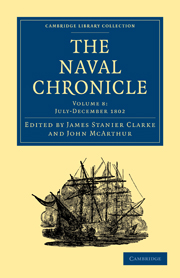 The Naval Chronicle
The Naval Chronicle Book contents
- Frontmatter
- PREFACE TO THE EIGHTH VOLUME
- PLATES IN VOLUME VIII. From Original Designs
- BIOGRAPHICAL MEMOIRS OF THE LATE SIR CHARLES SAUNDERS, K. B. ADMIRAL OF THE BLUE SQUADRON, AND SOME TIME FIRST LORD COMMISSIONER OF THE ADMIRALTY
- BIOGRAPHICAL MEMOIRS OF THE LATE LORD MULGRAVE
- BIOGRAPHICAL MEMOIRS OF THE RIGHT HON. LORD GARDNER, VICE-ADMIRAL OF THE BLUE SQUADRON, MAJOR-GENERAL OF MARINES, AND ONE OF THE REPRESENTATIVES IN PARLIAMENT FOR THE CITY OF WESTMINSTER
- BIOGRAPHICAL MEMOIRS OF GEORGE LORD ANSON, ADMIRAL OF THE WHITE SQUADRON, AND ADMIRAL OF THE FLEET
- BIOGRAPHICAL MEMOIRS OF SIR THOMAS GRAVES, K. B. REAR-ADMIRAL OF THE WHITE SQUADRON
- BIOGRAPHICAL MEMOIRS OF THE LATE SIR GEORGE POCOCK, K. B. ADMIRAL OF THE BLUE SQUADRON
- INDEX
BIOGRAPHICAL MEMOIRS OF GEORGE LORD ANSON, ADMIRAL OF THE WHITE SQUADRON, AND ADMIRAL OF THE FLEET
Published online by Cambridge University Press: 10 January 2011
- Frontmatter
- PREFACE TO THE EIGHTH VOLUME
- PLATES IN VOLUME VIII. From Original Designs
- BIOGRAPHICAL MEMOIRS OF THE LATE SIR CHARLES SAUNDERS, K. B. ADMIRAL OF THE BLUE SQUADRON, AND SOME TIME FIRST LORD COMMISSIONER OF THE ADMIRALTY
- BIOGRAPHICAL MEMOIRS OF THE LATE LORD MULGRAVE
- BIOGRAPHICAL MEMOIRS OF THE RIGHT HON. LORD GARDNER, VICE-ADMIRAL OF THE BLUE SQUADRON, MAJOR-GENERAL OF MARINES, AND ONE OF THE REPRESENTATIVES IN PARLIAMENT FOR THE CITY OF WESTMINSTER
- BIOGRAPHICAL MEMOIRS OF GEORGE LORD ANSON, ADMIRAL OF THE WHITE SQUADRON, AND ADMIRAL OF THE FLEET
- BIOGRAPHICAL MEMOIRS OF SIR THOMAS GRAVES, K. B. REAR-ADMIRAL OF THE WHITE SQUADRON
- BIOGRAPHICAL MEMOIRS OF THE LATE SIR GEORGE POCOCK, K. B. ADMIRAL OF THE BLUE SQUADRON
- INDEX
Summary
Intaminatis fulget honoribus.
Ulysses' voyage lives by Homer's pen,
Who many cities saw and many men;
Shipwrecks and sufferings, fancy could display,
In a small portion of the midland sea;
But what to Anson's were Ulysses' toils?
Or what to India's wealth were Ilium's spoils?
The world surrounded, all the nations view'd,
Each climate tried, each danger now subdu'd;
Our second Drake, arriv'd on British ground,
His toils with laurels and with honour crown'd.
Anon.The recital of the most distinguished actions of eminent men, is at once a reward and an encouragement to merit, and serves to convey useful information in the most agreeable form. Among the heroes who have contributed to the naval glory of their country, and who stand high on the records of fame, the name of Anson holds a prominent place. Our illustrious seaman was the second and youngest son of William Anson, Esq. of Shugborough, in the county of Stafford, a gentleman of an ancient and respectable family, and Elizabeth his wife, one of the daughters and coheirs of Ralph Lane, Esq. and sister to Mary Countess of Macclesfield. Discovering an early passion for the naval profession, and taking the greatest delight in reading and hearing the stories of our most celebrated voyagers and Admirals, his father gave him an education suitable to his genius; and having served the usual period, in the year 1722, he was made a Commander, and appointed to the Weazle sloop.
- Type
- Chapter
- Information
- The Naval ChronicleContaining a General and Biographical History of the Royal Navy of the United Kingdom with a Variety of Original Papers on Nautical Subjects, pp. 265 - 352Publisher: Cambridge University PressPrint publication year: 2010First published in: 1802


